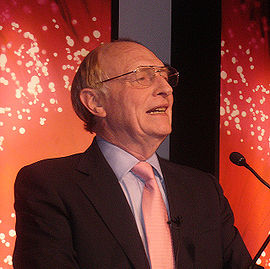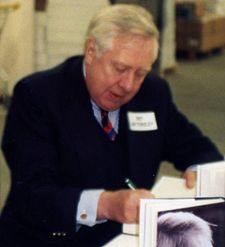_leadership_election,_1983.gif)
Labour Party (UK) leadership election, 1983
Encyclopedia


United Kingdom
The United Kingdom of Great Britain and Northern IrelandIn the United Kingdom and Dependencies, other languages have been officially recognised as legitimate autochthonous languages under the European Charter for Regional or Minority Languages...
for the leadership of the Labour Party
Labour Party (UK)
The Labour Party is a centre-left democratic socialist party in the United Kingdom. It surpassed the Liberal Party in general elections during the early 1920s, forming minority governments under Ramsay MacDonald in 1924 and 1929-1931. The party was in a wartime coalition from 1940 to 1945, after...
. It occurred when former leader Michael Foot
Michael Foot
Michael Mackintosh Foot, FRSL, PC was a British Labour Party politician, journalist and author, who was a Member of Parliament from 1945 to 1955 and from 1960 until 1992...
resigned after winning only 209 seats at the 1983 general election
United Kingdom general election, 1983
The 1983 United Kingdom general election was held on 9 June 1983. It gave the Conservative Party under Margaret Thatcher the most decisive election victory since that of Labour in 1945...
— a loss of 70 seats compared to their performance at the previous election
United Kingdom general election, 1979
The United Kingdom general election of 1979 was held on 3 May 1979 to elect 635 members to the British House of Commons. The Conservative Party, led by Margaret Thatcher ousted the incumbent Labour government of James Callaghan with a parliamentary majority of 43 seats...
four years earlier. This was the worst showing for Labour
Labour Party (UK)
The Labour Party is a centre-left democratic socialist party in the United Kingdom. It surpassed the Liberal Party in general elections during the early 1920s, forming minority governments under Ramsay MacDonald in 1924 and 1929-1931. The party was in a wartime coalition from 1940 to 1945, after...
since 1931
United Kingdom general election, 1931
The United Kingdom general election on Tuesday 27 October 1931 was the last in the United Kingdom not held on a Thursday. It was also the last election, and the only one under universal suffrage, where one party received an absolute majority of the votes cast.The 1931 general election was the...
.
Four contenders stood to replace Foot: Neil Kinnock
Neil Kinnock
Neil Gordon Kinnock, Baron Kinnock is a Welsh politician belonging to the Labour Party. He served as a Member of Parliament from 1970 until 1995 and as Labour Leader and Leader of Her Majesty's Loyal Opposition from 1983 until 1992 - his leadership of the party during nearly nine years making him...
, Roy Hattersley
Roy Hattersley
Roy Sydney George Hattersley, Baron Hattersley is a British Labour politician, author and journalist from Sheffield. He served as Deputy Leader of the Labour Party from 1983 to 1992.-Early life:...
, Eric Heffer
Eric Heffer
Eric Samuel Heffer was a British socialist politician. He was Labour Member of Parliament for Liverpool Walton from 1964 until his death. His working-class background and consciousness fed in to his left-wing politics, but to an extent disguised the depth of his knowledge: with 12,000 books in...
and Peter Shore
Peter Shore
Peter David Shore, Baron Shore of Stepney PC was a British Labour politician and former Cabinet Minister, noted in part for his opposition to the United Kingdom's entry into the European Economic Community. His idiosyncratic left-wing nationalism led to comparison with the French politician...
, with Kinnock favoured to win. The results of the election were:
| Candidate | Affiliated Trade unions in the United Kingdom Trade unions in the United Kingdom were first decriminalised under the recommendation of a Royal Commission in 1867, which agreed that the establishment of the organisations was to the advantage of both employers and employees... | Constituencies Constituency Labour Party A Constituency Labour Party is an organisation of members of the British Labour Party who live in a particular UK parliamentary constituency in England, Scotland and Wales. The Labour Party in Northern Ireland has, since February 2009, been organised as a province-wide Constituency Labour Party... | PLP Parliamentary Labour Party In UK politics, the Parliamentary Labour Party is the parliamentary party of the Labour Party in Parliament: Labour MPs as a collective body.... | Total | |
|---|---|---|---|---|---|
| Neil Kinnock | 29.042 | 27.452 | 14.778 | 71.272 | |
| Roy Hattersley | 10.878 | 0.577 | 7.833 | 19.288 | |
| Eric Heffer | 0.046 | 1.971 | 4.286 | 6.303 | |
| Peter Shore | 0.033 | 0 | 3.103 | 3.137 |
Neil Kinnock won the election with an outright majority and Roy Hattersley
Roy Hattersley
Roy Sydney George Hattersley, Baron Hattersley is a British Labour politician, author and journalist from Sheffield. He served as Deputy Leader of the Labour Party from 1983 to 1992.-Early life:...
became his deputy, beating Michael Meacher
Michael Meacher
Michael Hugh Meacher is a British Labour politician, who has been the Member of Parliament for Oldham West and Royton since 1997. Previously he had been the MP for Oldham West, first elected in 1970. On 22 February 2007 he declared that he would be standing for the Labour Leadership, challenging...
. Kinnock remained leader until 1992. Kinnock fought in two further elections, both unsuccessfully. He failed to beat Margaret Thatcher
Margaret Thatcher
Margaret Hilda Thatcher, Baroness Thatcher, was Prime Minister of the United Kingdom from 1979 to 1990...
in the 1987 general election
United Kingdom general election, 1987
The United Kingdom general election of 1987 was held on 11 June 1987, to elect 650 members to the British House of Commons. The election was the third consecutive election victory for the Conservative Party under the leadership of Margaret Thatcher, who became the first Prime Minister since the 2nd...
despite gaining some seats. Kinnock resigned as leader after a fourth successive Labour
Labour Party (UK)
The Labour Party is a centre-left democratic socialist party in the United Kingdom. It surpassed the Liberal Party in general elections during the early 1920s, forming minority governments under Ramsay MacDonald in 1924 and 1929-1931. The party was in a wartime coalition from 1940 to 1945, after...
defeat and the hands of John Major
John Major
Sir John Major, is a British Conservative politician, who served as Prime Minister of the United Kingdom and Leader of the Conservative Party from 1990–1997...
in the 1992 election
United Kingdom general election, 1992
The United Kingdom general election of 1992 was held on 9 April 1992, and was the fourth consecutive victory for the Conservative Party. This election result was one of the biggest surprises in 20th Century politics, as polling leading up to the day of the election showed Labour under leader Neil...
. He resigned as leader shortly afterwords, paving the way for John Smith.

